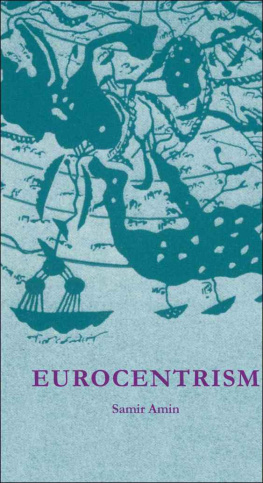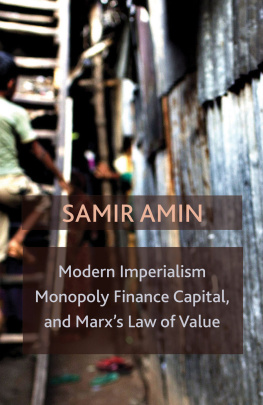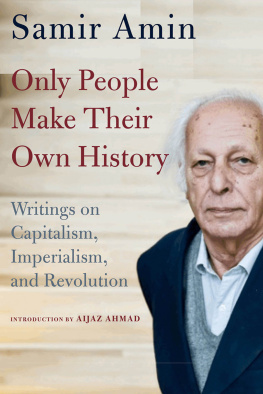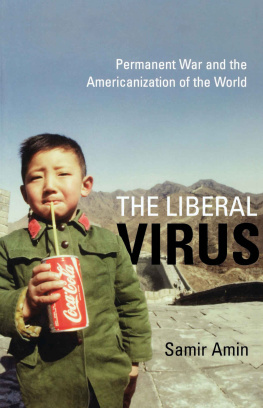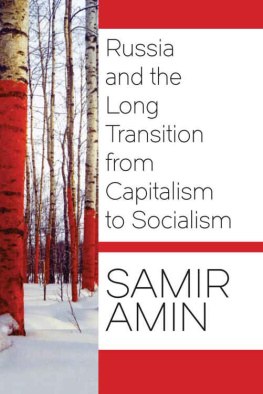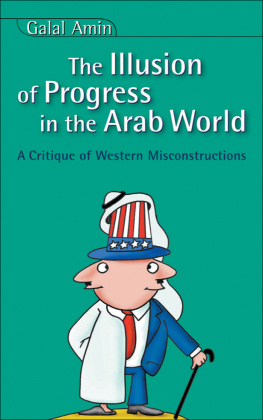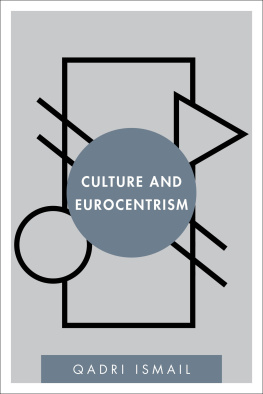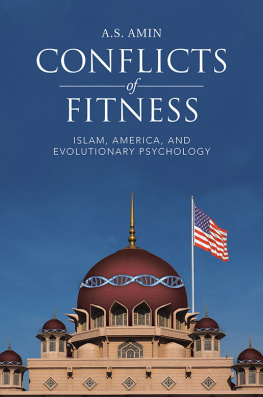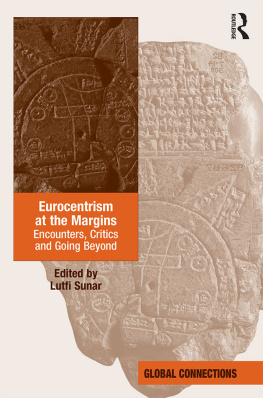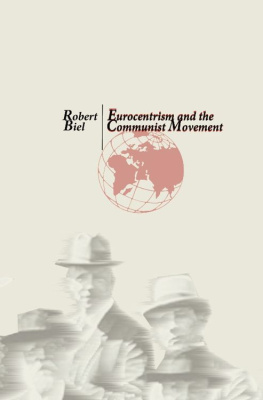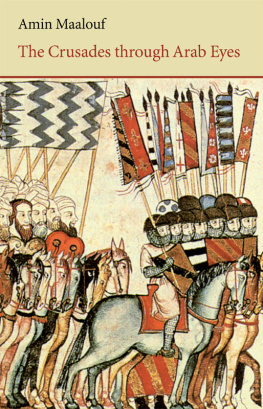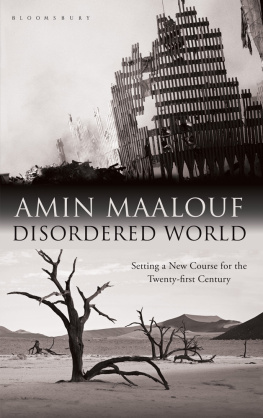Eurocentrism
Eurocentrism
Modernity, Religion, and Democracy
A Critique of Eurocentrism and Culturalism
by SAMIR AMIN
translated by RUSSELL MOORE
and JAMES MEMBREZ

Copyright 2009 by Samir Amin
All rights reserved
Originally pubalished as Leurocentrisme: Critique dune ideologie
by Anthropos, Paris, France, 1988 by Anthropos-Economica
English translation published by Monthly Review Press 1989
Library of Congress Cataloging-in-Publication Data
Monthly Review Press
146 West 29th Street, Suite 6W
New York, NY 10001
5 4 3 2 1
Contents
Preface
In this work, I propose a critique of what can be called culturalism. I define culturalism as an apparently coherent and holistic theory based on the hypothesis that there are cultural invariants able to persist through and beyond possible transformations in economic, social, and political systems. Cultural specificity, then, becomes the main driving force of inevitably quite different historical trajectories.
Modernity arose in Europe, beginning in the Renaissance, as a break with the traditional culture, which had, until then, been dominated by an ideology that I have called tributary (in reference to the tributary mode of production of which feudalism is a particular variant). Modernity is constructed on the principle that human beings, individually and collectively (i.e., societies), make their own history. Up until that time, in Europe and elsewhere, responsibility for history was attributed to God or supernatural forces. From that point on, reason is combined with emancipation under modernity, thus opening the way to democracy (which is modern by definition). The latter implies secularism, the separation of religion and the state, and on that basis, politics is reformed.
Modernity is the product of nascent capitalism and develops in close association with the worldwide expansion of the latter. The specific logic of the fundamental laws that govern the expansion of capitalism leads to a growing inequality and asymmetry on a global level. The societies at the peripheries are trapped in the impossibility of catching up with and becoming like the societies of the centers, today the triad of the United States, Europe, and Japan. In turn, this distortion affects modernity, as it exists in the capitalist world, so that it assumes a truncated form in the periphery. The culture of capitalism is formed and develops by internalizing the requirements of this asymmetric reality. Universalist claims are systematically combined with culturalist arguments, in this case Eurocentric ones, which invalidate the possible significance of the former.
Inevitably, modernity compelled a reinterpretation of religious beliefs, making them compatible with its main principle, that human beings can and must make their own history. Eurocentric culturalism maintained that it was the religious revisions, and particularly the Protestant Reformation, that were the prime cause of the social transformation that led to modernity. My position is precisely the opposite of these theories, particularly the one proposed by Max Weber. Religious reinterpretations were, on the contrary, more the product of the necessities of the social transformation than their cause. They were not any less important, whether they facilitated or retarded change on one particular evolutionary path or another.
Today, modernity is in crisis because the contradictions of globalized capitalism, unfolding in real societies, have become such that capitalism puts human civilization itself in danger. Capitalism has had its day. The destructive dimension that its development always included now prevails by far over the constructive one that characterized the progressive role it fulfilled in history.
The crisis of modernity is itself the sign of the obsolescence of the system. Bourgeois ideology, which originally had a universalist ambition, has renounced that ambition and substituted the postmodernist discourse of irreducible cultural specificities (in its crude form, the inevitable clash of cultures). As opposed to this discourse, I suggest that we begin with a view of modernity as a still incomplete process, which will only be able to go beyond the mortal crisis it is now undergoing through the reinvention of universal values. This implies the economic, social, and political reconstruction of all societies in the world.
In The Liberal Virus: Permanent War and the Americanization of the World, I emphasized the extreme form taken by the ideology of contemporary capitalism, what I called the liberal virus. The latter reduces the content of social organization to two and only two principles: liberty (mainly viewed as freedom of private enterprise) and property. This reduction, which I analyze as being the product of the involution to which the ideology of modernity was subject in the historical formation of culture in the United States, is at the heart of the tragic impasse that threatens to imprison civilization. Will European societies, whose more subtle political culture allows for dialectical conflict between the economic and the political, and the societies of the South, major victims of the pauperization associated with the accumulation of capital, be able to take up these challenges? Or will they rather submit passively to the Americanization of the world with its trail of permanent wars and genocides?
Nearly twenty years ago, I proposed a systematic critique of the Eurocentric deformation in the dominant worldview, its past and its future. I think the theses and analyses offered in Eurocentrism are still valuable and even more relevant today than they were earlier.
PART ONE
Modernity and Religious Interpretations
I. MODERNITY
Reason and Emancipation
There are two periods in history that have had a decisive impact on the formation of the modern world. The first of these periods involves the birth of modernity. It is the period of the Enlightenment, the European seventeenth and eighteenth centuries, which is also, fortuitously, the period of the birth of capitalism. I will summarize their significance in the following two propositions.
The first concerns the definition of modernity, which is the claim that human beings, individually and collectively, can and must make their own history. This marks a break with the dominant philosophy of all previous societies, both in Europe and elsewhere, based on the principle that God, having created the universe and mankind, is the legislator of last resort. The ethical principles based on this divine legislation are, naturally, formulated by historical transcendental religions or philosophies, thereby opening the door to various interpretations through which constantly changing social realities are expressed. Reason is often, but not always, invoked to serve these interpretations, but then it remains subject to the duty of reconciling faith and reason. Under modernity, people are freed from this obligation, without necessarily losing interest in the question of faith. The new claim closes one chapter, but opens another with its own problems: the freedom which human beings give themselves must be defined in its turn. History, while it no longer operates as a force outside of humanity, must be explained by other laws. The discovery of these laws is the object of a new set of sciences focused on humanity and society. The formation of these sciences now becomes both possible and necessary. Reason is called on, once again, in the search for the objective determinants of the development of societies. The new freedom which modern humanity gives itself, therefore, remains subject to the constraints of what is thought to constitute the logic of social reproduction and the dynamics of the transformation of societies.
Next page
